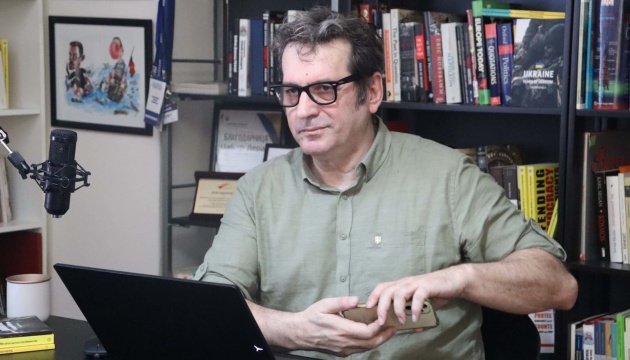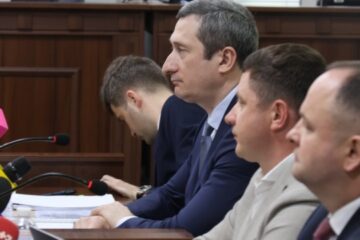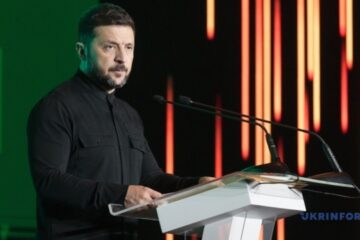Xhabir Deralla is a Macedonian civic activist, journalist, and co-founder of the influential non-governmental organization CIVIL Today – Center for Freedom, based in Skopje, as well as Defending Democracy Global Initiative (it’s an initiative functioning through its founders, based in Berlin, London, Rome and Skopje). For many years, he has been actively engaged in the fields of media, human rights, peacebuilding, and democratic development. Under his leadership, CIVIL Today is known for its initiatives aimed at promoting peace, fostering interethnic understanding, combating disinformation, and supporting democratic processes in North Macedonia and beyond.
Since 2022, Xhabir Deralla has been an outspoken supporter of Ukraine in its struggle against Russian aggression. In 2023, he was awarded the Order of Merit, 3rd Class, for his significant personal contribution to strengthening intergovernmental cooperation and supporting Ukraine’s sovereignty and territorial integrity.
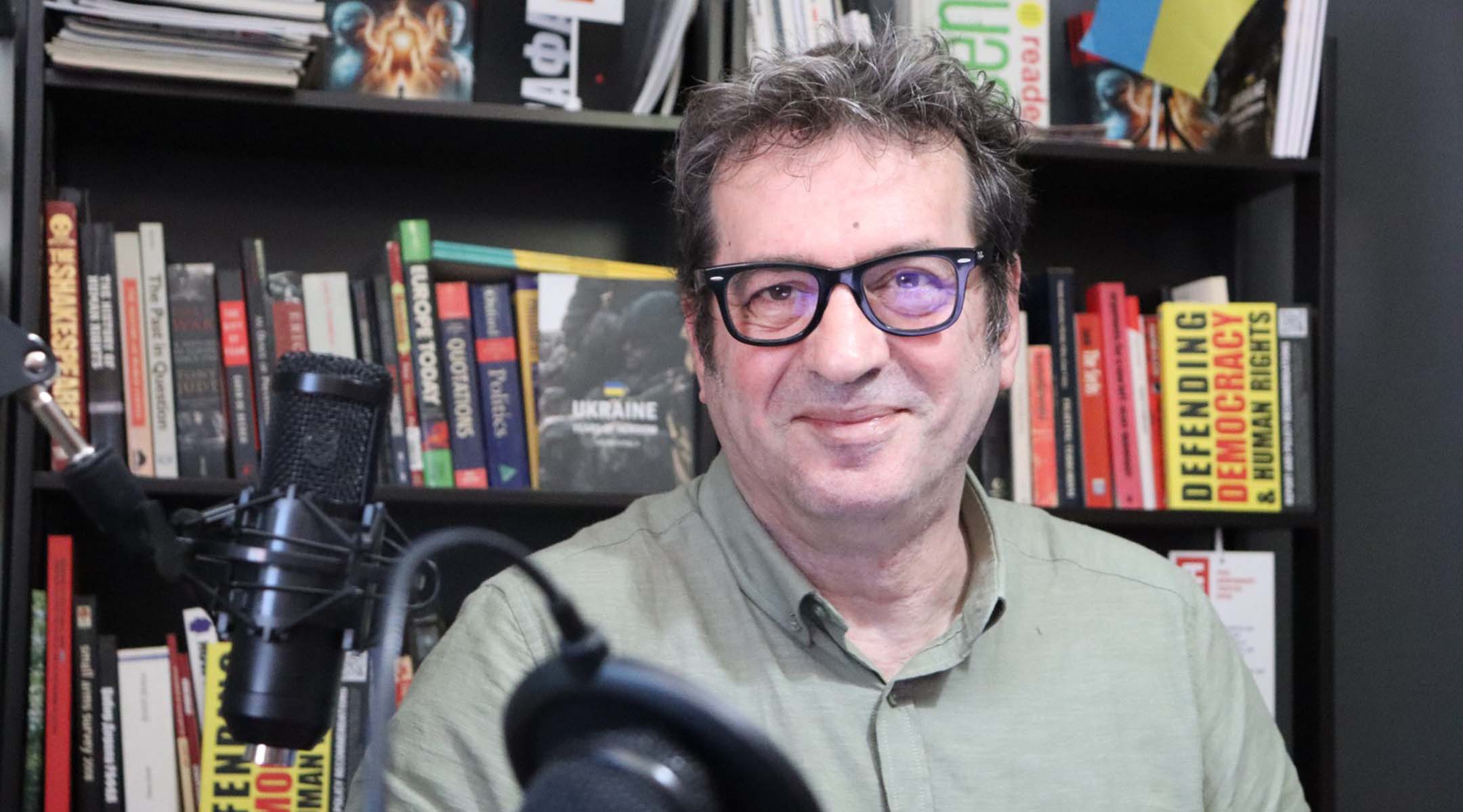
DEMOCRACY CANNOT SURVIVE UNLESS UKRAINE IS FULLY LIBERATED
– You’re one of the main advocates of Ukraine in the Balkans and even received an Order of Merit from President Zelensky in 2023. How did your personal and professional journey lead you to this deep understanding of the current security situation?
– I was deeply moved by the Revolution of Dignity that was an example for endurance, for defiance, for bravery, for courage of the common people, of the citizens of Ukraine that wanted freedom and democracy. They only wanted what belongs to every human being. So being in a country that also struggled with the authoritarian regime at that time, we looked into it as an example, and we expressed solidarity with Maidan. And of course, it’s very important to say that many of us in Northern Macedonia were outraged when the Russian boots stepped on Ukrainian soil in Crimea and parts of Donbas. And myself, I expressed my solidarity in various ways. In my researches, I learned very early about the Holodomor which happened in the beginning of the 30s of the last century under the Soviet Union domination, or I would say occupation that lasted many decades.
As a professional, as a journalist and editor-in-chief of our media platform in Macedonian, Albanian, and English, I never missed a day of work to reveal the truth about Ukraine, the truth about the Russian oppression and occupation of parts of Ukraine. It was a real brutal military aggression.
And of course, when it comes to Crimea, I think it’s worth mentioning that I’m also the public defender, a public advocate of the journalist Vilen Temeryanov from Crimea, a journalist that has been arrested back in August 2022 after Russia’s full-scale invasion. And I’m working on advocating for his freedom. He was submitted to torture, to punitive psychiatry, to imprisonment, and we don’t actually know where this colleague of ours is. And he’s not alone.
There are still hundreds of journalists held in Russian captivity. Since the very first moments of the full-scale invasion — when, before 4 a.m. on February 24, 2022, Russian tanks crossed into sovereign Ukrainian territory — I have stood with the Ukrainian people, day and night. But my greatest recognition is not receiving an award. It is the message of hope that I carry — the hope that Ukraine will see freedom, sooner rather than later, with our continued solidarity and support.
I have witnessed firsthand the reach of Russian propaganda in the Western Balkans. I’ve seen the damage it inflicts — how it poisons public discourse, fuels divisions, and corrodes trust in democracy. That’s why I’ve always known: this is not just a war over Ukraine’s territory or sovereignty. It is a war for all of us.
– You visited Ukraine after the start of the full-scale war. What were your main purposes and your meetings here?
– I would visit Ukraine much more often — even live there — if not for my obligations in North Macedonia and the Balkans, including work related to Ukraine. I visited Kyiv twice in 2023. The first time was as part of the delegation of North Macedonia’s Foreign Minister Bujar Osmani, who chaired the OSCE that year. The second visit was in December with Deputy Ombudsman Jovan Andonov.
During both visits, I attended events and panels, including ones with President Zelensky and global leaders.
I also used the opportunity to gain first-hand insights by speaking with Ukrainian journalists and officials, including MP Oleksandr Merezhko and General Vadym Skibitsky. I visited places like Hostomel, and School No. 2 near Kyiv, hit hard during the spring 2022 Russian offensive — which had briefly been used as a Russian base before liberation. I reported on these experiences through Civil Today, where I serve as editor-in-chief of the English edition. Our audience includes readers in Germany, the UK, the U.S., France, and Italy.
But what left the deepest impact on me were the people of Kyiv — civilians, soldiers on rotation, shop owners, the young and the elderly, those who had lost loved ones, firefighters, and police officers. What struck me most was their determination. No matter who I spoke with, I saw an unshakable will for freedom and dignity — even at the cost of their lives. The courage and stoicism I witnessed in Ukraine are something every nation could learn from — and should honor forever.
– You co-founded the Defending Democracy Global Initiative, which includes some of Ukraine’s Western allies. What does it do, actually?
– The Defending Democracy Global Initiative was launched in December 2024, right after the international conference “Defending Democracy and Human Rights in the Face of War, Nationalism and Authoritarianism,” where Ukraine was central. Seeing the momentum, we created the initiative immediately after the event. I co-founded it with Dr. Wolfgang Ressmann, a civil society and media expert with over ten years of experience working in Ukraine, and Roger Casale, a former UK MP and government official who now leads the New European People’s Forum. Both are strongly committed to the defense of democracy and to supporting Ukraine.
As a result of our work, we produced a 200-page policy document, including 60 pages of strategic recommendations. These recommendations are practical, concrete, and fully implementable. One of the ten chapters is entirely dedicated to Ukraine, and the rest also address Ukraine in the context of the global struggle for democracy.
The document stresses that Ukraine’s freedom and global democracy are indivisible. Democracy cannot survive unless Ukraine is fully liberated within its internationally recognized borders, and unless war criminals — including Putin, Lukashenko, and other enablers like the Iranian and North Korean regimes — are held accountable.
The proposed actions include continued military support and upgrades for Ukraine, fighting disinformation and hybrid threats, ongoing financial and humanitarian assistance, and strengthening Ukrainian state institutions. All of this is possible, and the only thing missing is political will. These steps can be taken — if the decision is made.

UKRAINE’S STRUGGLE IS CENTRAL TO DEFENDING DEMOCRACY
– You also co-founded another initiative, Westminster Alliance for Ukraine, in May 2025. Could you please provide more details about how it functions and its connections to the UK Parliament?
– We were joined by the Jean Monnet Association in France and the Italian think tank Centro Studi Internazionali, represented by Philippe Laurette, Francesco Gaudiosi, and Emanuele Erichiello. Our goal is to bring together parliamentarians, government officials, media, civil society, academia, and experts—but especially parliamentarians, because they are key to building a true “coalition of the willing.”
We aim to show political leaders, institutions, industry, and the broader European public that Ukraine’s struggle is central to defending democracy, international law, and freedom across the continent. Ukraine’s fight is not only for its own survival — it’s for the survival of democracy and freedom in Europe. That’s the message we bring to leaders, institutions, and citizens alike. Ukraine is the frontline of Europe’s future.
While our initiative is new, it’s built on the experience of longstanding individuals and organizations. We simply joined forces—and the impact is growing rapidly. Each day we see more engagement and support. I truly believe this momentum will influence parliaments and governments across Europe. And while we’re not the only initiative pushing for action—thankfully—we must all work together to apply pressure on decision-makers.
Because every minute of hesitation costs lives.
As Olivier Védrine from the Jean Monnet Association said during the Westminster Alliance for Ukraine launch: “We must stop helping Ukraine to survive. We must help Ukraine to win.” That sentence captures the essence of what needs to be done. If we truly want to defend democracy, not just in Ukraine but also around the world, we must help Ukraine achieve victory.
SEEKING PEACE WITH PUTIN MEANS NORMALIZING BRUTALITY AND GENOCIDE
– We can see now that some Western decision-makers are distracted by the Iran-Israel conflict. And Putin and Russia benefit from it, because attention is being distracted from Ukraine. What should be done to keep Ukraine in focus?
– I understand your point, but I believe we shouldn’t be asking governments to simply keep Ukraine high on the agenda—we need to make it clear that Ukraine is the agenda. Yes! Ukraine is the agenda. Everything else is connected to Russia’s imperialist aggression. If the Kremlin is defeated, if Ukraine wins, and if war criminals face justice, many of today’s global conflicts will lose their momentum or stop altogether, because they are fueled by Kremlin actions. That’s why global decision-makers must not let Ukraine fall.
This isn’t just about territory—if Ukraine falls, we all fall. That’s the message that needs to be communicated clearly to leaders around the world. And now, when Putin speaks of peace, we must remember that his “peace” is paid for with blood. His so-called diplomacy is just missile terror, targeting civilians daily. Seeking peace with Putin today only means normalizing brutality and genocide. That must not be accepted. I continue working to expose this truth, and I know you do too.
RUSSIAN PROPAGANDA CROSSES BORDERS AND CONTINENTS
– Xhabir, you are the author of the book “Ukraine – Years of Heroism: Facts vs. Propaganda.” And it emphasizes, among other things, the role of disinformation and the hybrid threats that Russia is posing. And as we know, after the start of the full-scale offensive against Ukraine, some of these sources, like Russia Today, were shut down in North Macedonia. Still, they were active before and had some influence. So, what, in your opinion, were the biggest misunderstandings of these narratives, false narratives about Ukraine? And how do you see it in North Macedonia now? Because I’m sure that Russian propaganda is still active there.
– When the full-scale invasion began, North Macedonia quickly aligned with the EU by banning Russian state propaganda channels like RT and Sputnik. I welcomed the move, but soon realized it didn’t stop the spread of Russian narratives—it merely removed the logos. The propaganda adapted, infiltrated new platforms, and found local hosts like a virus, often supported by corruption and subversive Russian activity.
In fact, disinformation only grew stronger, deeply embedding itself in Macedonian media, political discourse, and through networks of influencers on social media. Some political parties openly justify Russia’s aggression, while others disguise support with talk of “neutrality” or “objectivity.” Authorities were warned by us at CIVIL – Center for Freedom and by others, but no effective response followed.
The propaganda persists with the same false narratives: that Ukraine “started the war”, that Russia “is defending itself from NATO”, that President Zelensky “is illegitimate”, and that “the West profits from the war”. These ideas are deliberately injected into all sectors—media, politics, academia, even parts of civil society. The Russian embassy is very active, and North Macedonia is heavily influenced by Serbia, Russia’s main proxy in the region, which openly broadcasts RT and Sputnik content across the Balkans. The problem is compounded by corruption and economic interests. Some officials appear pro-Russian, others are possibly afraid or compromised. This trend is dangerous because it weakens democratic institutions and erodes links with Euro-Atlantic structures. We fight it daily, because once these narratives take hold, democracy itself starts to decay.
– Some people in North Macedonia say, “We don’t share a border with Russia or Ukraine — why should we care?” What threat does Russia pose to North Macedonia?
– Russia poses a threat on several levels. First, it undermines democracy. Second, it obstructs our Euro-Atlantic integration — although we’ve been a NATO member for years, our path to the EU remains blocked, and Russian influence plays a role in that. Interethnic tensions are rising, nationalism is growing, and our internal security is weakening.
In today’s interconnected world, you don’t need to be a neighboring country to feel the consequences. Russian propaganda crosses borders and continents — we saw this clearly in the U.S., and we see it here too. Even though we’re far from Ukraine, we are not immune. Our democracy, economy, freedoms, and peace are also under threat. People need to understand that.
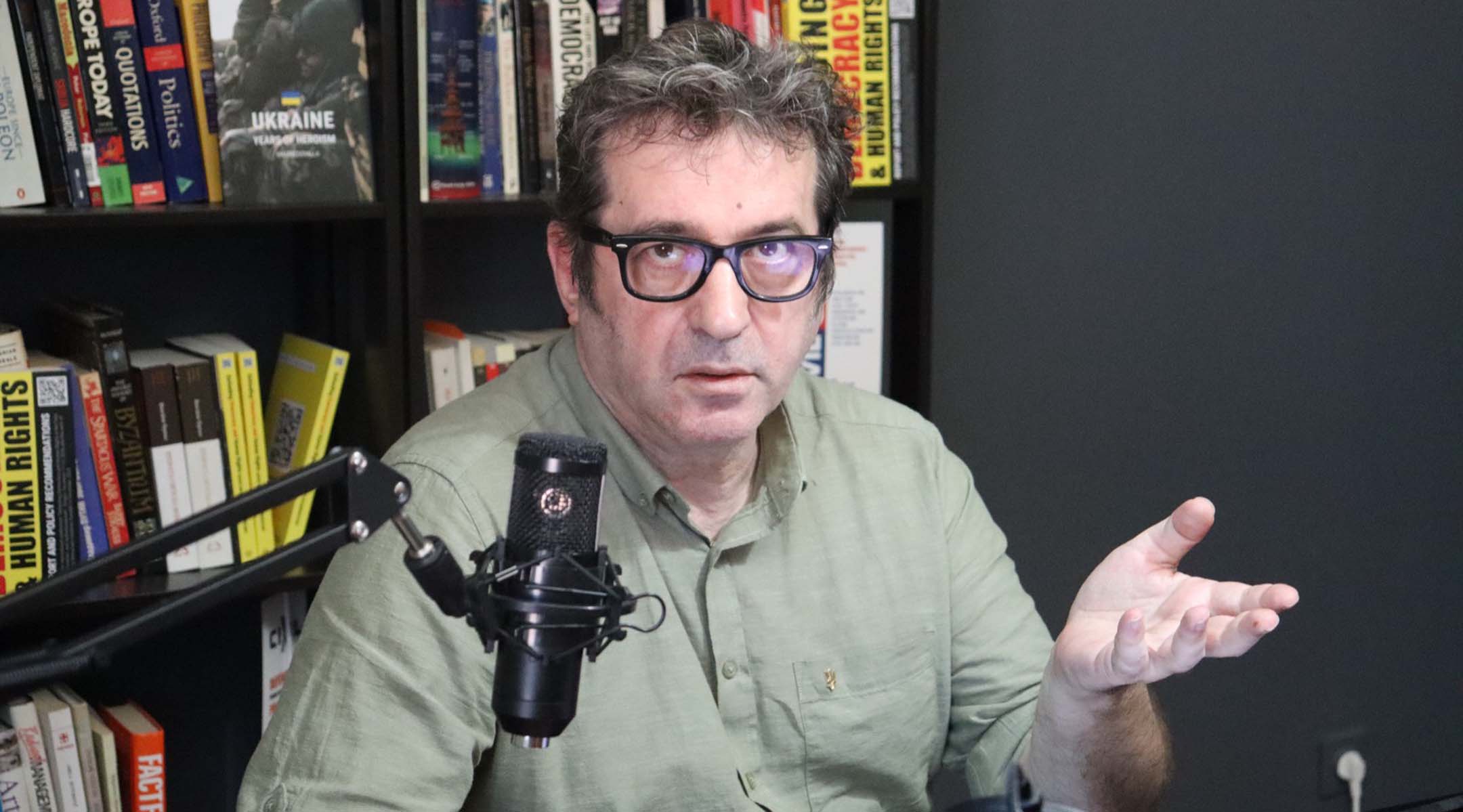
LIES LEAD TO THE DEATH OF CHILDREN AND CIVILIANS
– What is the role of civil society in the West in supporting Ukraine and is there something else that can be done except protests and donations?…
– This war is vast and complex, and it’s not just against Ukraine. Protests are important—they build public awareness, which in democratic societies creates pressure on governments and parliaments. Donations also matter as signs of solidarity and humanity, but they’re not enough.
We should learn from Ukrainian civil society, which demonstrates remarkable resilience—similar to the resistance movements against fascism in the 1930s and 40s. If we truly want to help, we must adopt the same mindset and determination. Civil society in the West, in the Balkans, and beyond needs to go beyond symbolic actions.
First, we must fight disinformation and false narratives wherever they appear—in media, in personal conversations, in social media feeds. Lies are deadly—they lead to the death of children and civilians. Everyone understands what a lie is, and we must call it out, even if it comes from a friend or family member.
Second, we need to build bridges across all sectors—political, ethnic, ideological, social—to unite people around the truth and the urgency of the moment.
Third, and most urgently, we must demand that our governments abandon appeasement. Every minute of inaction costs lives. When leaders say “whatever it takes” to support Ukraine, they must act accordingly. Europe has resources—it needs the will to use them. Civil society must put sustained pressure on governments to act decisively, because this war affects not only Ukraine, but the future of democracy everywhere.
– What, in your opinion, can be accepted as peace in Ukraine, considering that we will always have this neighbor with imperialistic issues?
– Where do we even begin? With over 20,000 Ukrainian children abducted by Russia—most of them still missing, with fewer than 400 returned so far? At this rate, it could take decades—30, 40, even 50 years—to bring them all back. Or should we start with the cities completely wiped off the map, the thousands killed, tortured, deported? And yet some still talk about “peace” with Russia—as if peace means letting Putin take what he wants just to stop the bombs. That’s not peace. That’s surrender. That’s betrayal. And it’s an open invitation to the next war he will start.
Putin has ruled for 25 years. We know exactly how he operates. His regime may be militarily inefficient and cowardly in some ways, but it’s still capable of inflicting massive civilian suffering. His missiles destroy residential buildings, schools, kindergartens—every day. So, what should real peace look like?
It must mean the full restoration of Ukraine’s internationally recognized borders, the return of abducted citizens, reparations paid by Russia, prosecution of war criminals—including Putin—and a massive effort to rebuild what has been destroyed. The only viable path forward lies with the coalition of the willing: the UK, Germany, France, Italy and Poland, as well as the Baltic states, Scandinavian countries, and others who understood from the beginning what is truly at stake. Germany, France, and others took longer—but the consensus is growing.
This is not just about Ukraine. If Putin isn’t defeated, democracy across the world weakens, international law collapses, and authoritarianism wins. We don’t have the luxury of time. Every minute we waste talking about “Putin’s peace”—which is just code for occupation and terror—means more lives lost, more homes destroyed, more children traumatized. And with each minute of hesitation, we lose not only Ukrainian lives—we lose a piece of our own humanity.
Anna Kostiuchenko, Kyiv
Photo credit: Biljana Jordanovska

